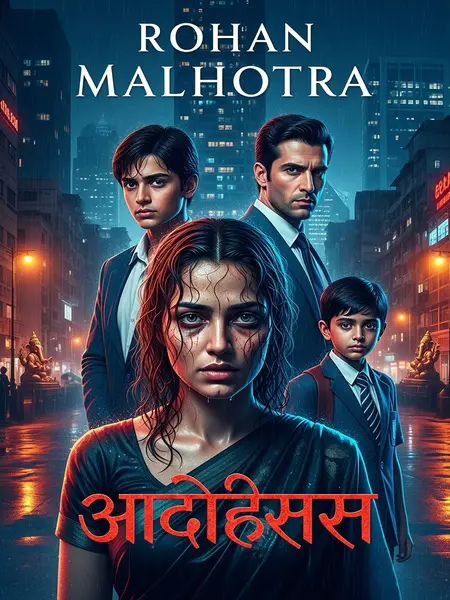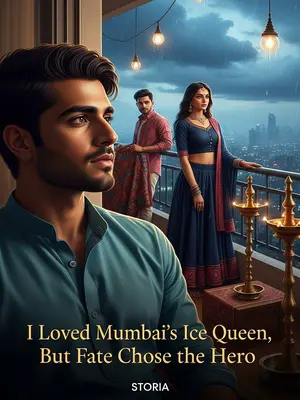Chapter 8: Rumours in Black and White
15
The bookstore signed a long-term contract with the company across the street, so I often volunteered to run errands there. Sometimes, I’d catch a glimpse of Rohan Malhotra from afar.
He always wore black, never a hint of any other colour. The only exception was the white collar of his shirt.
He moved quickly, always surrounded by subordinates in suits, their heads bowed.
To outsiders, he was cold and unapproachable, nothing like the pale, vulnerable man I’d seen that night.
Sometimes, passing by the office, I’d overhear employees gossiping in the staffroom over chai.
They said that their terrifying boss’s office didn’t have a single splash of colour—not even a marigold. The whole decor was oppressive, all grey and black.
Rohan Malhotra’s early-deceased wife was no secret. Maybe because his son often came to the company, or maybe because of the plain ring he wore, never taking it off.
They even speculated that Rohan Malhotra, living like a sadhu, was keeping himself chaste for his late wife.
I hugged a stack of books, head down, slipping silently through the crowd.
For the first time, I started to wonder if agreeing to this mission was a mistake.
The office smelt of filter coffee and mothballs, and the older clerks argued about the best way to make sambar even as they gossiped about their boss. I kept my head bent, not wanting to be drawn in, but their words clung to me like the smell of turmeric after a busy kitchen shift. My arms ached from the books, my heart from something less tangible.
16
I’d been in this world for over two months, and from what I’d seen, Rohan Malhotra truly loved his late wife.
No wonder every strategist before me had failed.
My own progress was abysmal.
Maybe the bullet comments saw how hopeless I was—now, they barely even bothered to scold me.
My existence felt like it was tainting the love between Rohan Malhotra and his late wife.
I had no past, and seemingly no future.
Should I keep going with this hopeless mission?
Lost in thought, my arms full of books, I didn’t notice when the stack bumped into a beautiful woman in a white suit, holding coffee.
Most of the coffee spilled onto the books—and all over her white collar.
I bowed my head, frantically trying to wipe the books and apologising.
The woman’s voice was sharp as she grabbed my arm: “Who let you in here?”
I explained I was from the bookstore downstairs.
She sneered, “I’ve never heard of anyone in the company working with some shabby little bookstore.”
The hiss of the coffee machine behind us mingled with the rising murmur of the office crowd. My ears burned with shame. Her diamond earrings glinted as she yanked my arm, her perfectly manicured nails digging in. I tried to keep my eyes fixed on the floor, the urge to shrink away so strong I could taste the bitterness in my mouth.
17
More and more people turned to look.
I kept my head down, still apologising. “Your clothes... I can wash them for you, or buy you a new one.”
“Can you even afford it?” She looked me up and down with disdain.
Her nails were sharp; she easily yanked my hair and pulled off my mask.
My face was exposed. I heard someone behind me gasp.
“You...” The woman in front of me was stunned.
I closed my eyes briefly, then raised my hand to put the mask back on, hiding my embarrassment.
“Sorry,” I said, bowing my head. “Whatever you want to do about this, I’ll accept it.”
The room fell silent.
Suddenly, the lift chimed—a crisp “ding.”
The doors slid open, and someone stepped out.
A tall figure cast a shadow at my feet.
The silence was heavy, everyone’s gaze darting between me and the woman. I felt exposed, raw, as though the office tube lights were a spotlight and I was the accused in some family panchayat. The mask felt damp against my skin. I tried to keep my hands from trembling, wishing for nothing more than to vanish into the crowd.
18
“I’m the one who signed the purchase contract with their bookstore.”
Rohan Malhotra’s voice was low and cold, devoid of warmth. But the moment he spoke, everyone in the room lowered their heads.
Faster than I could react, the bullet comments exploded—
This time, the screen was filled with nothing but question marks.
[Did I miss an episode?]
The air seemed to freeze, and all the pride on the woman’s face drained away. The staff, usually so noisy, fell silent as if struck by a collective hush that only true power inspires. For the first time, I sensed eyes shifting to me not with contempt but with something closer to fear—or was it curiosity? My pulse raced as the bullet comments spun on, but I could only stare at the man who, with a single sentence, had changed everything.
But as the system’s warning echoed in my head, I realized: in this city, even the dead don’t get to rest.





